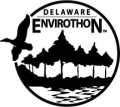Advisors will be responsible for training their team:
- Workshops for each resource area will be provided for advisors and their students. A maximum attendence, per team, may be issued depending on the workshop location.
- Resource material will be provided in the form of resource trunks containing a collection of specific training tools for each category along with website content.
- Resource professionals are available for extra training sessions as per their schedule. Delaware ENVIROTHON Planning Committee members are prohibited from conducting one-on-one training outside scheduled workshops.
- Advisors will be encouraged to participate in independent programs, field trips, and other opportunities offered in related areas throughout the state.
Team Registration
Final team registration must be made by the posted date for that year’s event (usually in mid-March). This will require the naming of five (5) team members and alternates. Teams not registered by this deadline cannot participate in the State Competition.
The ENVIROTHON competition is designed to get students involved in learning about many different environmental disciplines. The amount of information provided to ENVIROTHON teams may seem overwhelming to team members and advisors. This guide is designed to help teams prepare for the ENVIROTHON by encouraging teamwork and a multi-disciplinary approach to environmental problem solving.
Helpful Hints
- There are five subject areas and five team members. A team could assign each member an area of primary concentration and secondary concentration. This way, each team will have two members knowledgeable about, for example, forestry. Then, share the information with the others in practice sessions. Another way to divide the labor is to have several team members focus on natural history and identification and other members focus on the resource management issues for each section. Assessing the skills of each member will determine which is the best approach for your team. Remember, no resource professional can know everything. Teamwork is essential in the real world. Learning how to work as a team is essential to your success in the ENVIROTHON.
- Make sure all team members are familiar with basic ecology terms and current environmental issues. They should also develop an understanding of the interrelationship between all the topic areas and how the management of one resource may affect another.
- Map reading is an important skill for natural resource professionals. Learn how to read and interpret a U.S. Geologic Survey topographic map as an introduction to other map resources.
- This Guide contains sections on each of the five study areas. The introduction gives a rational for studying the topic. The objectives provide a detailed outline of the kinds of information teams are expected to know. Based on these objectives, students can develop a strategy for studying each topic. Teams should use the practice exercises to strengthen their skills.
- Each team is provided study materials for the ENVIROTHON. Each section in this material contains an outline and a list of references. There are also lists of resource professionals available to help teams, including those at your local conservation district office.
- Advisors are encouraged to use the resource materials to develop environmental units for their classrooms. This will expand the ENVIROTHON Program to include more students than just those on the team.
